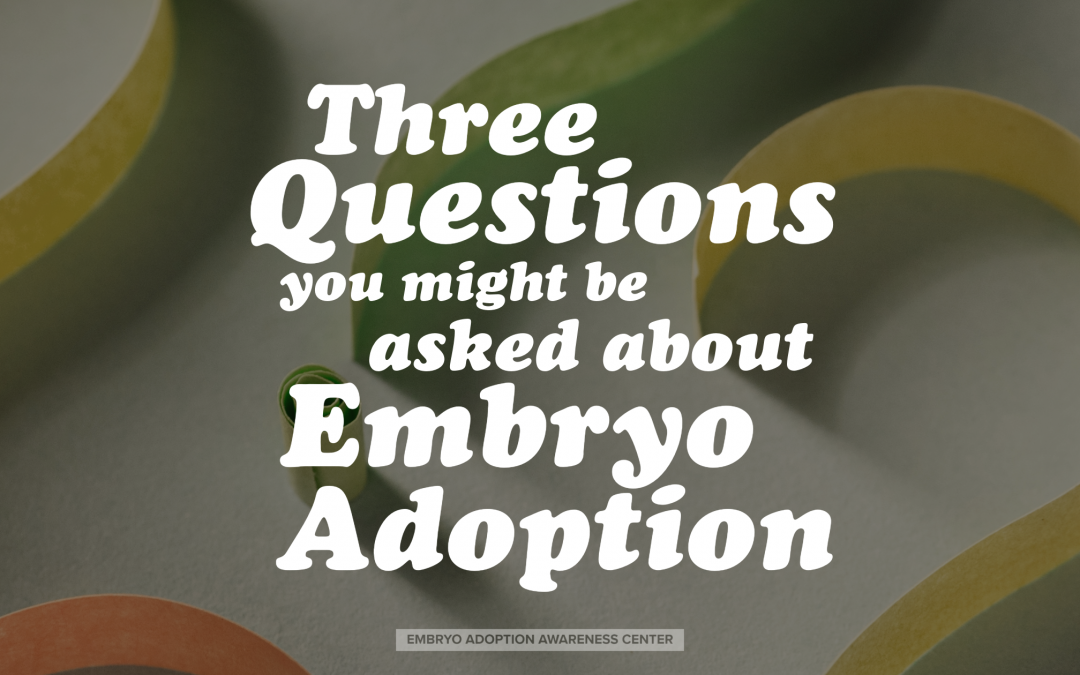You have recently made the decision to build your family through embryo adoption. It is unlike any other adoption journey! Not only are you assisting an embryo donor family by providing a solution to their remaining embryos, but also you will be getting the chance to grow your family, and getting to experience the pregnancy and birth of your adopted child.
Perhaps you have selected your embryo adoption program and are waiting to be matched with embryos. Maybe around this time you decide to start letting your friends and family know about the path that you have taken to grow your family. Now the questions come rolling in…
While your friends and family most likely mean well, sometimes it can come across as rude, or even catch you off guard if you are not prepared for it. Remember, there was a time when you were new to the idea of embryo adoption, too. Everyone has to start somewhere!
Here are three commonly asked questions that you might get about embryo adoption, and ways that you can navigate them.
1. “Do you not want your own kids?”
The term ‘your own kids’ can be extremely harmful, but does not necessarily come from a malicious place in the person who asked it. If you are speaking to a family member about embryo adoption and they have asked you this question, there is a good chance that they simply have not had the time yet to grieve the loss of their own genetic line.
It is very important to make sure that you have properly grieved the loss of your genetic children before speaking to others, as it will aid you in talking with others. An appropriate response would be to address the fact that any child brought into your family would be your child, regardless of whether they share your genetics or not. You could also point out how extra loved and cared for embryo adopted children are by the family who decided to donate them for reproduction and by you as the adoptive family.
2. “Can ‘the other family’ take the baby back?”
The individuals who ask this question likely have domestic adoption or foster care on their minds, where the birth parents can choose to parent their child after the baby has been born, sometimes even after the child has been placed with adoptive parents. Perhaps they are worried that as soon as the embryo donor family sees a picture of your precious baby, they will immediately want to take the child back.
When a baby is born, the woman who gave birth to the baby is listed on the birth certificate as the mother, and her husband is listed as the father. This makes embryo adoption the most secure form of adoption, and is also why embryo adoption does not have to be finalized in court. In the United States, embryos are viewed as property. Therefore, when the contracts are signed, it is a transfer of ownership that is legally occurring. You could also add to your response by saying that the embryos are legally yours before they even arrive at your fertility clinic.
3. “Can you really call this adoption?”
The short answer is a resounding YES! This is not just a fertility treatment. When you transfer an embryo, you are hoping to achieve a pregnancy and welcome a child into your family. Parenting a child that you are not genetically related to is the definition of adoption.
When you choose to adopt embryos through an adoption agency, such as the Snowflakes Embryo Adoption Program, you will be required to complete a home study and education, sign contracts, and have some sort of openness in your relationship with the placing family. This is following the best practices of adoption. It is absolutely okay to state that it is adoption because you are completing the same steps that anyone else takes when adopting a child domestically or internationally. It is just taking place a little earlier than “normal.”
While there are many different questions that you may be asked throughout your embryo adoption journey, these are the top three that we have heard. We hope that you now feel more equipped to answer the questions of your family and friends, and feel more empowered in the decision that you have made to grow your family.
For a more in depth look at these questions and others, check out this video on how to talk to your friends and family about embryo adoption.
To learn more about embryo adoption or donation, visit EmbryoAdoption.org.


Recent Comments